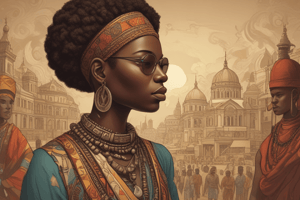Podcast
Questions and Answers
What is the primary concern of African American Studies as a discipline?
What is the primary concern of African American Studies as a discipline?
What is the result of suppressing anyone's personality, economic or cultural expression, civilization, gender, or religion?
What is the result of suppressing anyone's personality, economic or cultural expression, civilization, gender, or religion?
What must the oppressed do to regain a sense of freedom?
What must the oppressed do to regain a sense of freedom?
According to Afrocentrist thought, what forms of discrimination and oppression must be addressed?
According to Afrocentrist thought, what forms of discrimination and oppression must be addressed?
What is the ultimate goal of addressing forms of discrimination and oppression?
What is the ultimate goal of addressing forms of discrimination and oppression?
What is the primary objective of critiquing hegemony and other forms of domination?
What is the primary objective of critiquing hegemony and other forms of domination?
What is the key factor in building a useful social discourse in Black Studies?
What is the key factor in building a useful social discourse in Black Studies?
What is Eurocentricity characterized as in the context of culture?
What is Eurocentricity characterized as in the context of culture?
What is the primary role of the operators of oppressive systems?
What is the primary role of the operators of oppressive systems?
What is the ultimate goal of Afrocentric research methodology?
What is the ultimate goal of Afrocentric research methodology?
What is the conventional wisdom regarding scientific research and political considerations?
What is the conventional wisdom regarding scientific research and political considerations?
What is the approach advocated by Africana Studies theorists in generating knowledge?
What is the approach advocated by Africana Studies theorists in generating knowledge?
What is the focus of the examination of W.E.B.Du Bois and E.Franklin Frazier's contributions?
What is the focus of the examination of W.E.B.Du Bois and E.Franklin Frazier's contributions?
What is the outcome of the social science establishment's response to Du Bois, Frazier, and others' issues?
What is the outcome of the social science establishment's response to Du Bois, Frazier, and others' issues?
What is the significance of W.E.B.Du Bois and E.Franklin Frazier's work in the context of Africana Studies?
What is the significance of W.E.B.Du Bois and E.Franklin Frazier's work in the context of Africana Studies?
What is the goal of alternative approaches to knowledge generation in Africana Studies?
What is the goal of alternative approaches to knowledge generation in Africana Studies?
What is the context in which Africana Studies scholars are exploring alternative approaches to knowledge generation?
What is the context in which Africana Studies scholars are exploring alternative approaches to knowledge generation?
What is the significance of liberatory social science research methods in the context of Africana Studies?
What is the significance of liberatory social science research methods in the context of Africana Studies?
What is the focus of contemporary efforts by Africana Studies researchers?
What is the focus of contemporary efforts by Africana Studies researchers?
What is the outcome of the social science establishment's response to Du Bois, Frazier, and others' issues in the 1960s?
What is the outcome of the social science establishment's response to Du Bois, Frazier, and others' issues in the 1960s?
What is a primary objective of Africana Studies?
What is a primary objective of Africana Studies?
What is one of the fundamental objectives of Africana Studies?
What is one of the fundamental objectives of Africana Studies?
What is the significance of faculty and student collaboration in Africana Studies?
What is the significance of faculty and student collaboration in Africana Studies?
What is a key aspect of Africana Studies' approach to knowledge generation?
What is a key aspect of Africana Studies' approach to knowledge generation?
What is a defining characteristic of a discipline, according to Karenga?
What is a defining characteristic of a discipline, according to Karenga?
What is one of the seven core subject areas of Africana Studies?
What is one of the seven core subject areas of Africana Studies?
What is the significance of critical analysis in Africana Studies?
What is the significance of critical analysis in Africana Studies?
How does Africana Studies approach the understanding of human community and exchange?
How does Africana Studies approach the understanding of human community and exchange?
What is the outcome of faculty and student collaboration in Africana Studies?
What is the outcome of faculty and student collaboration in Africana Studies?
What is the significance of the African cultural and intellectual framework in Africana Studies?
What is the significance of the African cultural and intellectual framework in Africana Studies?
Flashcards are hidden until you start studying
Study Notes
Afrocentric Idea
- The Afrocentric idea critiques the historiography of social knowledge and the sociology of history to free the minds of the oppressed.
- Afrocentricity is committed to anti-oppressive and anti-racist analysis, using tradition and reason as twin towers to establish a subject analysis for culture.
###Eurocentric Model
- The Eurocentric model imposes Europe and European individuals as the norms of human culture, human relations, human interactions, social theory, and social institutions.
- This model is universalizing, implying that Europe is above other cultural spheres, rather than alongside them.
Inclusive vs. Co-Cultural Approach
- The term "inclusive" implies that minorities are to be included in the European cultural sphere, rather than recognizing cultural spheres as equal.
- A co-cultural approach recognizes communication between cultures as an equal affair, rather than superior and inferior cultures.
Theory and Practice
- Theory without a basis in human practice is without historical substance.
- Afrocentricity seeks to identify with all efforts to reassert the centrality of African agency in human phenomena, based on historical substance and practice.
Impact of Enslavement and Segregation
- Over 350 years of enslavement and segregation have resulted in immense psychological, social, cultural, and political dislocations for Africans in the Americas and Caribbean.
- This has led to dislocations, including the idea that they are not oppressed.
Afrocentric Analysis
- Afrocentric analysis links the affirmation of African centrality in our own story to practice, underscoring the determination that a progressive revolution in thought and action can occur only through centered-ness.
- Afrocentricity works because it can interpret technological, economic, and structural developments in society, as well as provide an explanation for the orientations, stresses, choices, and religious locations of the African people.
Challenge to Privilege
- African American Studies as a discipline is inherently an instrument of challenge to any type of essentialist privilege.
- Suppressing anyone's personality, economic or cultural expression, civilization, gender, or religion creates the state of oppression.
Metaresearch and Citation Analysis in Africana Studies
- Weissinger's (2002) citation analysis found that "Dream Team" Africana American Studies faculty members published 4 times more often in discipline-specific than in Africana Studies periodicals.
- In contrast, non-Dream Teamers published twice as much in Africana Studies than in discipline-specific periodicals.
- Weissinger's findings suggest that traditional academia suppresses the activist element of Black Studies research, which is forced "off campus".
Alternative Approaches to Knowledge Generation
- Afrocentricity (Asante, 1988) and the "jazz" model of Africana Studies (Stewart, 2004a) are alternative theories of systematic knowledge production.
- These approaches aim to bridge the dichotomy between academic research and political advocacy.
Geographic Information Systems (GIS) in Africana Studies
- GIS allows researchers to integrate data and methods, enabling new types of analysis and modeling.
- GIS can refine ecological approaches to Black community research (Frazier) and multipanel design (Du Bois).
- GIS methods can also allow for the development of interdisciplinary models and multidimensional outcome predictions.
Interdisciplinary Approaches to Research
- Karenga's subject matter approach to defining Africana Studies' interdisciplinarity (1982, 2002) involves the sequential or simultaneous layering of maps exhibiting different variables for a given geographical space.
- This approach enables individuals from different disciplinary orientations to generate interpretations of observed patterns.
Critique of Traditional Social Science Research
- The conventional wisdom is that scientific research should be uncontaminated by political considerations and that theoretical research is superior to applied research.
- Africana Studies scholars argue that this approach is flawed and that alternative approaches to knowledge generation should be explored.
Historical Precedents and Contemporary Efforts
- The contributions of W.E.B. Du Bois and E. Franklin Frazier to exploring the strengths and weaknesses of social science are examined as precursors to contemporary efforts by Africana Studies researchers.
- Their attempts to adapt and modify social science values, theories, and methods, as well as their experimentation in bridging the social science-artistic/humanistic divide, are seen as precursors to contemporary efforts.
Africana Studies: An Interdisciplinary Discipline
- Africana Studies offers a critique of existing conceptions of the world and provides a multicultural and African-centered paradigm, contributing to alternative ways of viewing and engaging the world.
- The discipline integrates knowledge and methodologies from various disciplines to create a new body of knowledge with a new language and logic.
- To be interdisciplinary, Africana Studies must create a distinctive interrogative and integrative process, searching for erasures, omissions, and distortions in discipline-specific projects.
The Role and Value of Knowledge
- In an African-centered understanding, knowledge is never for knowledge's sake but for human sake, aiming to improve the condition of the world and enhance its prospect.
- This Afrocentric understanding is reaffirmed in ancient Egyptian and Yoruba sacred texts, The Husia and Odu Ifa.
Challenges and Possibilities of Africana Studies
- The mission of Africana Studies is to identify its role, relevance, and goals in engaging with the world.
- The methodology of Africana Studies is based on a philosophical foundation and framework that informs its engagement, distinguishing it from method.
- The Kawaida perspective, a critical cultural perspective, privileges tradition, requires reason, and insists on practice in both knowledge and its ultimate value.
Objectives of Africana Studies
- Provide students with a critical integrated overview of the discipline, its core subject areas, mission, research issues, and schools of thought.
- Enhance critical thinking through engaging oppositional propositions and thinking in the discipline.
- Engage historical and current events to cultivate critical analysis and social ethical concern for the human condition.
- Heighten awareness of the role of race, class, and gender in human community and exchange.
- Use the African initiative and experience to cultivate critical appreciation of diversity.
Defining Africana Studies
- A discipline is defined as a self-conscious organized system of research and communication in a defined area of inquiry and knowledge.
- Africana Studies is challenged to continue defining itself through its ongoing intellectual production of a defining and definitive basic literature.
Studying That Suits You
Use AI to generate personalized quizzes and flashcards to suit your learning preferences.


